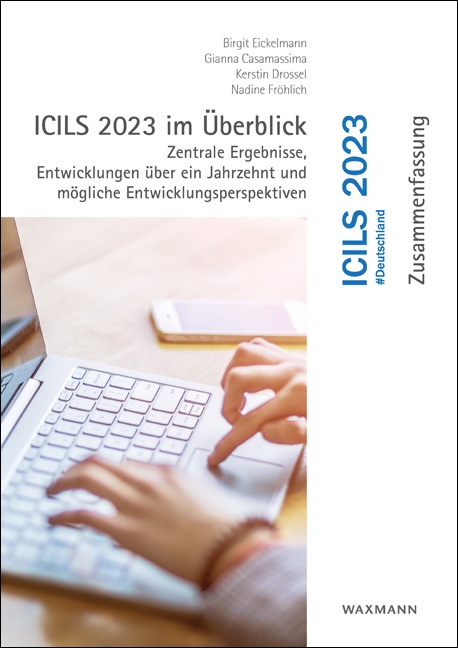Decline in students’ digital skills TU Braunschweig takes part in international comparative study
The safe and competent use of digital media has become increasingly important in recent years. This means that school education also has a responsibility to teach students how to use digital media in a competent, reflective, productive and communicative way. The ‘International Computer and Information Literacy Study 2023’ (ICILS 2023) is an international comparative study of the state of these skills and competences. Professor Julia Gerick from the Institute of Education at Technische Universität Braunschweig is also involved as a member of the national consortium.

Professor Julia Gerick from the Institute of Education has been working on the International Computer and Information Literacy Study since 2013. Photo credits: Marina Polianskaja Photography
For the third time (after ICILS 2013 and ICILS 2018), the digital skills of eighth-grade students and the conditions of the skills competition in Germany were examined in an international comparison. This international education monitoring is based on computer-based tests of eighth-grade students and surveys of school principals, teachers and students. “The study thus provides an enormously important and unique database for mapping both the current state of digital transformation in Germany in an international comparison and developments over time. Our study thus provides relevant knowledge for action in the German education system,” says Professor Julia Gerick, who has been involved in ICILS since 2013.
Significant decline in skills
 One of the key findings of the study is that the computer and information literacy skills of eighth-grade students in Germany remain above the international average, with an average score of 502 points (international average: 476 points). However, this represents a significant decline in skills for Germany after the average skills remained statistically unchanged between ICILS 2013 (523 points) and ICILS 2018 (518 points). Only 1.1 per cent of Year 8 students (internationally 1.0 per cent; EU countries 0.8 per cent) reach the highest proficiency level. The proportion of students with rudimentary and basic skills, the two lowest proficiency levels, is 40.8 per cent. Proficiency levels vary widely according to the type of school attended and there are significant differences according to social background, migration background and language background.
One of the key findings of the study is that the computer and information literacy skills of eighth-grade students in Germany remain above the international average, with an average score of 502 points (international average: 476 points). However, this represents a significant decline in skills for Germany after the average skills remained statistically unchanged between ICILS 2013 (523 points) and ICILS 2018 (518 points). Only 1.1 per cent of Year 8 students (internationally 1.0 per cent; EU countries 0.8 per cent) reach the highest proficiency level. The proportion of students with rudimentary and basic skills, the two lowest proficiency levels, is 40.8 per cent. Proficiency levels vary widely according to the type of school attended and there are significant differences according to social background, migration background and language background.
The technical equipment of schools has improved. However, international comparisons also show that newer technologies, such as adaptive learning systems that adapt to individual differences in learners, urgently need to be expanded to support learning processes. The study also shows that teachers are using digital media in the classroom much more than in the past.
Worrying findings
“For me, two findings are particularly worrying: that such a high proportion of students only have digital skills at the lower two skill levels, and that we have a ‘digital divide’ in Germany in terms of digital skills,” said Professor Gerick. “In my opinion, a significant part of the younger generation does not have the necessary skills to participate in the digitalised world in a reflective, critical and self-determined way. This is not only a problem at an individual level, but also a threat to our democracy.”
The education system therefore continues to face major challenges in enabling all students to acquire the relevant skills on an equal footing, Professor Gerick said. It is clear that digital infrastructure alone is not enough. Professor Gerick emphasises: “In the future, it will be important to (further) develop sustainable learning environments for children and young people to acquire digital skills, and to systematically support and accompany school development processes and the actors shaping them, especially school management. Equally important is the comprehensive training and professional development of teachers with regard to their own digital skills, but also the transfer of these skills and the ability to help shape the digital transformation of school education”.
Professor Gerick is personally looking forward to the in-depth analyses of the ICILS data planned for the coming months and years, which will provide further insights.
